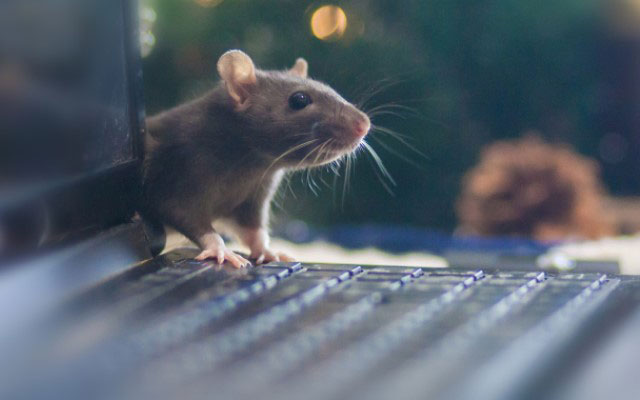Even the most passionate animal lover recoils on finding an infestation of vermin in their home. Apart from clean pets, rodents aren't as welcome.
These pests can sneak into your property and cause extensive and expensive damage if they go unnoticed. Here's how you can deal with a rat or mice infestation.

What are the signs my house has rats or mice?
If you spot a rodent darting across your kitchen floor, it's wise to assume it wasn't just passing through. So check for other tell-tale signs and look for where it got in.
- Droppings – Not pleasant but useful in identifying unwelcome guests. Expect to find these in dark areas below kitchen cupboards and the sink unit, under the bed or furniture, and in any room you don't often use. Not to be confused with harmless dead woodlice.
- Gnawed wood, plastic pipes or wiring insulation – Scratches or bite marks on your furniture, woodwork or wiring in the loft can be evidence of rats or mice.
- Holes – Rats and mice can chew through many materials, so look for holes appearing in your skirting or furniture.
- Noises – If you hear unfamiliar sounds coming from cavity walls, stud partitions or the loft, it's possible you've got an infestation.
Whatever the signs, act fast and don't wait for more evidence to follow.
What damage can rodents do to a home?
As well as being unpleasant and unhygienic, vermin can cause structural damage and damage to your belongings.
Structural damage
Rats and mice can chew their way through much organic matter – from wood to paper to books and clothes.
Rats under floorboards, or within stud walls and drywall linings could compromise the fabric by gnawing. If you don't solve the problem quickly it can become an expensive issue to repair.
Modern houses with concrete floors will be more resilient to these intruders.
Insulation
By making holes or removing insulation in your loft to build nests, mice can create thermal or cold bridges that stop your insulation working effeciently. This can not only affect your heating bill, but the cold bridge could possibly lead to condensation and rot in the joists.
Pipes
Mice and rats can also chew through your plastic pipes. Even the smallest hole in your pipe can lead to damp, or even flooding.
Other damage
Rodents can gnaw into upholstered furniture and wardrobes to create a hidden nest. If you have expensive furniture or clothing, they can quickly reduce how much they're worth.
Will my insurance cover me for vermin damage?
Insurers expect you to keep on top of the maintenance and hygiene of your property, and generally won't cover the cost of removing a mouse or rat infestation, or the repair of damage caused by them. You'll be expected to cover the costs of pest removal yourself.
Depending on your policy, buildings insurance could cover you for the consequences of an infestation, such as a fire or flood caused by of a gnawed pipe or electric wire.
Find out what we offer with our Defaqto rated home insurance.
How to get rid of rats
- Set a trap – This is a good first step, though it won't be enough if you have a serious infestation. But if you catch one or two sneaking in, you may find out where they're coming from and fill the gaps. Humane traps will catch the mouse or rat without injuring it, so you can release it somewhere far away from home.
- Cat'll do nicely – If you already own a cat, purrfect.
- Call a pest control service – Though it's the more expensive option, this will be the best way to get rid of rats, especially if you're dealing with a large infestation.
How to keep rats away
The best way to avoid an infestation is to deter rats and mice getting into your home. Rats and other rodents don't hibernate, so they can be a problem year-round. But it's during the winter that they might sneak in for a bit of warmth.
To keep any pests out:
- Keep food in metal or glass containers with tight-fitting lids.
- Clean your home regularly, paying special attention to the kitchen. Sweep your floor and check easy-to-forget areas, including under the toaster or the fridge. Reducing clutter means fewer places where vermin can hide.
- Inspect your walls and doorways and fix any gaps or holes.
- Keep trees trimmed so that they can't reach the upper floors of your home.
- Make sure the lids on your waste bins are kept closed.
- If you compost, invest in a rat-proof compost bin rather than leaving it in the open.
- In the garden, remove any fruits or plants that have fallen or started to decay.
Again, if you do spot signs of a rat or mouse, act immediately to prevent it becoming a bigger problem.
Published 16 September 2020
Author: Jim Hunt
